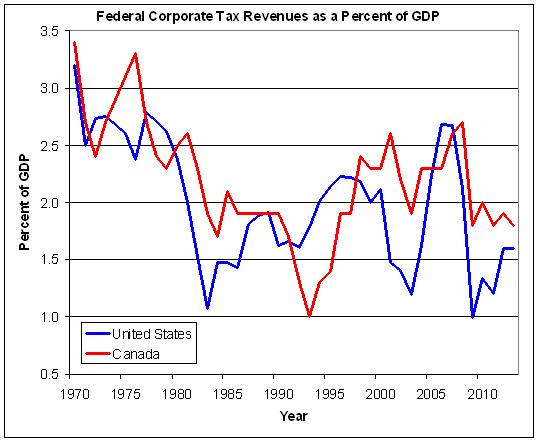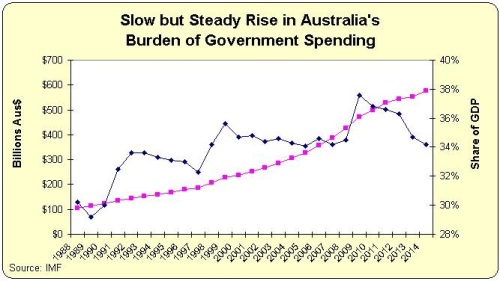I wrote a column for the Wall Street Journal last week about the policy debate over whether it’s better to lower tax rates or to provide targeted tax cuts for parents.
Since this meant I was wading into a fight between so-called reform conservatives (or “reformicons”) and traditional conservatives (or “supply-siders”), I wasn’t surprised to learn that not everyone agreed with my analysis.
James Pethokoukis of the American Enterprise Institute, for instance, doesn’t approve of what I wrote.
…why are some folks on the right against giving middle-class families a big tax cut and letting them keep more of what they earn? …Cato’s Dan Mitchell, in a Wall Street Journal commentary today, concedes Stein’s idea would indeed help middle-class families right now… Yet Mitchell still thinks cutting marginal tax rates is the better idea.
Pethokoukis accurately notes that I want lower marginal tax rates because, from my perspective, faster long-run growth would be even more beneficial to middle-class families.
He disagrees and offers five counter-arguments. Here they are (summarized fairly, I hope), along with my response.
1.) House Ways and Means Chairman Dave Camp has put forward tax reform with a top rate of 25% vs. 40% today. Yet his plan would likely increase the economy’s size by less than 1% over the next decade, according to the Joint Tax Committee. …This is not to say lower tax rates aren’t good for economic growth. But marginal rates at those levels are almost certainly already deep on the good side of the Laffer Curve.
I have a couple of reactions.
First, the top tax rate in the Camp plan is 35 percent rather than 25 percent, so we shouldn’t be surprised that the plan doesn’t generate much additional growth.
Second, the JCT’s model is flawed and it should not be given credibility by any supporter of good tax policy. The Tax Foundation has a much better model.
Though it doesn’t really matter in this case because the Tax Foundation analysis of the Camp plan also shows a very weak growth response, largely because the slightly lower tax rates in the Camp plan are “paid for” by increasing the tax burden on saving and investment. Which is why I also wrote that the plan was disappointing.
Regarding the point about the Laffer Curve, the Tax Foundation responded to the Pethokoukis criticism of my column by noting “the Laffer Curve refers to tax revenue, not economic growth. It says there is a tax rate at which tax revenue is maximized. The tax rate at which economic growth is maximized is almost certainly well below that.”
Needless to say, I fully agree. I want to maximize growth, not tax revenue.
Now let’s move to his second point.
2.) And consider this: just how would the GDP gains, such as they are, from cutting top marginal rates be distributed in an economy where middle-wage jobs are disappearing and income gains are tilted toward the highly skilled and educated? The US economy needs to grow faster, but faster growth alone in the Age of Automation may not substantially increase living standards for a larger swath of the American people. That reality is a big difference between the 2010s economy and the 1980s economy, one many on the right have yet to grasp. Cranking up GDP growth is necessary but not sufficient.
If I understand correctly, Pethokoukis is saying that faster growth doesn’t guarantee good jobs for everyone.
I don’t disagree with this point, but I’m not sure why this is a criticism of lower marginal tax rates. Isn’t it better to get some extra growth rather than no extra growth?
Now let’s address the third point from the Pethokoukis column.
3.) Mitchell asserts, “Tax-credit conservatives generally admit that child-oriented tax cuts have few, if any, pro-growth benefits.” That’s not true. …expanding the child tax credit would serve as a sort of human-capital gains tax cut for worker creators (also known as families). It might just be nudge enough for financially-stressed families to have another kid… Modern pro-growth policymakers should fret as much about the nation’s birthrate as productivity and labor-force participation rates. …A younger American society with a higher birth rate, helped by a tax code that offsets anti-family government policy, would be more dynamic, creative, and entrepreneurial.
I’m less than overwhelmed by this argument.
Yes, we have a demographic problem, but more population is merely a way of increasing total GDP, not per-capita GDP. And it’s the latter than matters if we want higher living standards.
In his fourth point, Pethokouis notes that both supply-siders and reformicons agree on policies to reduce the tax burden on saving and investment.
4.) To give Mitchell some credit here, he does acknowledge there is more to the conservative-reform tax agenda than the child tax credit.
Since we both agree, there’s no need to rebut this part of the column.
And I don’t think there’s anything for me to rebut in Pethokoukis’ final point.
5.) Let me add that there is more to the conservative reform agenda for the middle class than just tax reform, including regulatory, health care, K-12, and higher-education reform. And there should be more to the supply-side, pro-growth agenda than cutting marginal tax rates, including reducing crony capitalist barriers — such as Too Big To Fail megabank subsidies… American needs more growth, and worker creators (strong families) are just as important to achieving that as job creators (strong companies). Let’s have both.
Since I’m among the first to acknowledge that fiscal policy is only about 20 percent of what determines a nation’s prosperity, this is an area where I’m on the same page as Pethokoukis.

Reformicon Founding Fathers
Indeed, I wrote last year that there’s much to admire about the agenda of the reformicons.
I just think that they don’t have sufficient appreciation for the value of even small increases in long-run growth.
Let’s close by looking at one sentence from some supposed analysis by Matt O’Brien in the Wonkblog section of the Washington Post.
His column is dedicated to the proposition that Republicans are overly fixated on cutting taxes for the rich. That might be a defensible hypothesis, but I doubt O’Brien has much credibility since he misrepresents my position.
Daniel Mitchell of the Cato Institute downplays the idea that giving middle-class families more money even helps them, and says Republicans should keep focusing on cutting tax rates.
Just for the record, here’s what I actually wrote about middle-class families in my WSJ piece.
Child-based tax cuts are an effective way of giving targeted relief to families with children… The more effective policy—at least in the long run—is to boost economic growth so that families have more income in the first place. Even very modest changes in annual growth, if sustained over time, can yield big increases in household income. … If good tax policy simply raised annual growth to 2.5%, it would mean about $4,500 of additional income for the average household within 25 years. This is why the right kind of tax policy is so important. …since more saving and investment will lead to increased productivity, workers will enjoy higher wages, including households with children.
Does any of that sound like I’m indifferent to middle-class families? And the first sentence of that excerpt specifically says that the reformicon approach would mean relief to families with kids.
And the entire focus of my column is that supply-side tax policy would be even more beneficial to those households in the long run.
But accurately reporting what I wrote would have ruined O’Brien’s narrative. Sigh.
P.S. I wrote a couple of days ago that France was is a downward spiral because of high-tax statism. A few people have pointed out that French President Francois Hollande has picked a new industry and economy minister, Emmanuel Macron, who famously said that the new 75 percent top tax rate meant that France was “Cuba without the sun.”
Does this change my opinion, these folks have asked. Doesn’t this signal that taxes will start going down?
The answer is no. At best, I think it simply means that Hollande won’t push policy further to the left. But that doesn’t mean we’ll see genuine liberalization and a reduction in the fiscal burden of government.
If you think I’m being pessimistic, just keep in mind this excerpt from a Bloomberg story.
Macron apologized yesterday for his “exaggerated reputation” for free-market thinking.
I hope I’m wrong, but that doesn’t sound like the words of someone committed to smaller government?
Read Full Post »























































 For as little as £300 – less than half the cost of the service at a private clinic – they will be able to search an online database and choose an anonymous donor on the basis of his ethnicity, height, profession and even hobbies. …The National Sperm Bank will be based at Birmingham Women’s NHS Foundation Trust, which currently runs an existing NHS fertility clinic and recruits sperm donors from the local population. Funded by a £77,000 Government grant, the bank will be run by the National Gamete Donation Trust (NGDT) which this year received an additional £120,000 of public money to organise egg and sperm donation.
For as little as £300 – less than half the cost of the service at a private clinic – they will be able to search an online database and choose an anonymous donor on the basis of his ethnicity, height, profession and even hobbies. …The National Sperm Bank will be based at Birmingham Women’s NHS Foundation Trust, which currently runs an existing NHS fertility clinic and recruits sperm donors from the local population. Funded by a £77,000 Government grant, the bank will be run by the National Gamete Donation Trust (NGDT) which this year received an additional £120,000 of public money to organise egg and sperm donation.